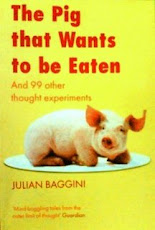Synopsis - Marco The Magnificent knows how Frank will choose when asked to pick one or both boxes. One box openly contains £1000 and the other is closed. The closed box could contain nothing or a million pounds. It's 'could' because Frank has to make a decision, with the knowledge that Marco apparently already knows how Frank will decide. Marco tells Frank "If you take just the closed box, it will contain a million pounds. If you take both, the closed box will be empty." If Marco is wrong, which he apparently never is, he'll give a million pounds to a random audience member.
This thought puzzle is called the Newcomb's paradox. The paradox comes about from the facts that 1. Frank could be sure and take the £1000; 2. Frank could be unsure and take the closed box and hope for the best 3. Frank could take both boxes and be sure of £1000 and have the possibility of another million. A question of how sure Frank can be in the situation.
What bothers me about this puzzle is that the outcome is already loaded. Marco has come out to say two things that screw with Frank's head: 1. Marco is never wrong and 2. If Frank took the closed box, the million would be in it. One statement supports the other.
Why should Frank doubt Marco's ability? Would Marco stake his credibility on a one-off error? After all, an error means Marco pays out a million to a random onlooker. Is the thought of losing extraordinary gain enough to play with Frank's mind? That's what the author is playing at - the fear of losing.
It seems totally logical to take the closed box.
Playing what if, what if Marco and Frank are in it together? It's a routine they play to mesmerize members of an audience for some future unravelling or misfortune? Hmmm. That's what happens when cynicism and too much TV combine.
Thursday, April 15, 2010
Subscribe to:
Post Comments (Atom)
.jpg)
No comments:
Post a Comment